The 8th Annual Translational and Transformative Informatics Symposium (ATTIS) was held at the Margaret Cameron Spain Auditorium on May 3. This year’s symposium, theme was “Drug Discovery in AI,” focusing on the relationship between cutting-edge drug discovery and groundbreaking advances in artificial intelligence.
An engaging gathering of minds
ATTIS drew nearly 170 registrants from over 50 institutions and organizations, including Emory University, the University of Utah, Michigan State University, the University of Texas Health Science Center at Houston, Vanderbilt University, and the Morehouse School of Medicine. ATTIS was a confluence of expertise and innovation.
Keynote speaker highlights the landscape of drug discovery
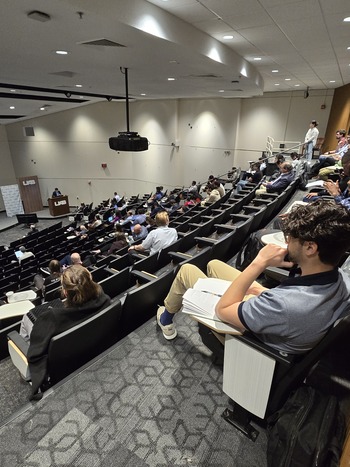
The symposium began with keynote speaker Alex Zhavoronkov, Ph.D., founder and CEO of Insilico Medicine. Zhavoronkov has been recognized as one of the top 100 AI leaders in drug discovery and advanced healthcare. His presentation, “Generative AI in Drug Discovery: Case Studies of Discoveries that Progressed Into Human Clinical Trials,” provided groundbreaking insights into targeted therapies and molecular-level drug mechanisms.
Research session discusses various aspects of drug discovery and AI

The research session of ATTIS, moderated by Jin Chen, Ph.D., provided compelling discussions on computational strategies for drug repurposing, drug combination prediction, the commercial success of mitochondria, pharmacogenomics testing in glioblastoma, and the integration of electronic records concerning AI.
Rapid-fire flash talks
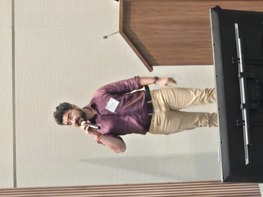
ATTIS also included rapid-fire flash talk sessions moderated by Chindo Hicks, Ph.D., of the Louisiana State University Health Sciences Center. These 8 to 10-minute discussions provided presenters the opportunity to elaborate on their research findings, ranging from the enhancement of drug discovery through user-friendly tools to identifying drug repurposing candidates through the development of disease molecular signatures.
Workshops discuss the evolution of drug discovery
The Computational Drug Discovery Workshop provided interactive presentations about the evolution of drug discovery, AI’s transformative role in preclinical studies, and the prospective role that AI will serve as part of future drug discoveries.
Panel discussions and technical sessions provide insight into AI experiences
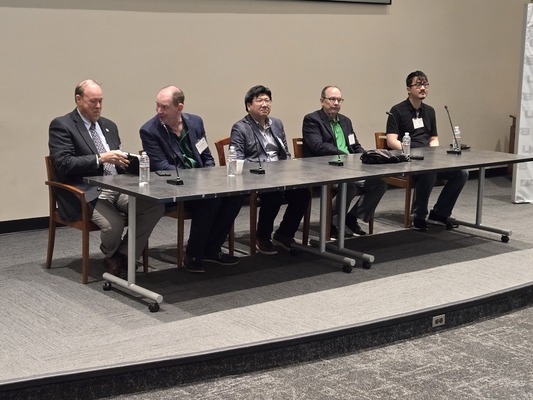
The ATTIS panel discussion, “AI in Drug Discovery: Hope or Hype?”, featured esteemed panelists: Robert D. “Rusty” Arnold, Ph.D., Aik Choon Tan, Ph.D., Joel H. Dobbs, Pharm.D., MPH, Executive in Residence and Senior Instructor, Mark M. Banaszak-Holl, Ph.D., and Sixue Zhang, Ph.D. Panelists spoke on their personal experiences and debated AI’s role in future drug discoveries. Audience members were able to provide their questions in real-time through an interactive application, including questions about how AI would potentially prioritize target identification, as well as whether there are studies on patient perspectives related to AI-led preclinical and clinical studies.
The technical session, moderated by Christopher Willey, M.D., Ph.D., professor of the Department of Radiation Oncology at UAB, included presentations from Bin Chen, Ph.D., Zhongming Zhao, Ph.D., Amit Mitra, and Robert Reynolds, Ph.D.
Celebrating excellence in research
The symposium concluded with the poster awards, celebrating top-notch research in drug discovery, precision medicine, and computational methods. The winners were:
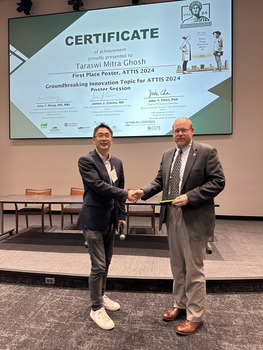 1st Place – Taraswi Mitra Ghosh, Auburn University
1st Place – Taraswi Mitra Ghosh, Auburn University
“Exploring SERPINEs as Precision Medicine Biomarkers for Targeted Therapies in Aggressive Prostate Cancer: Insights from Integrated Multi-Omics Pan-Cancer Analysis”
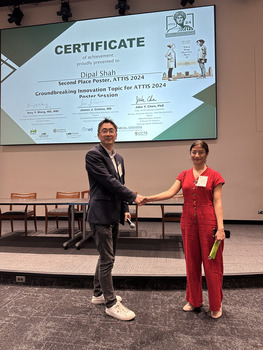 2nd Place – Dipal Shah, Ph.D., FGI (Helsinki, Finland)
2nd Place – Dipal Shah, Ph.D., FGI (Helsinki, Finland)
“Digital Twin of Pre-Clinical Trial: An Advanced Approach for Personalized Oncology Drug Screening”
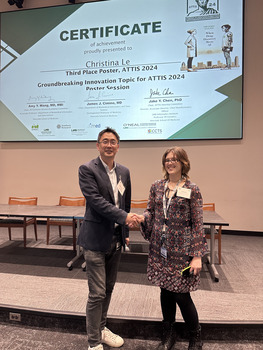
3rd Place – Christina Le, Ph.D., University of Alabama at Birmingham, Department of Pharmacology and Toxicology
“Structural Definition of Polyspecific Compensatory Ligand Recognition by P-glycoprotein”
The event was organized and hosted by the UAB Department of Biomedical Informatics and Data Science. The symposium was sponsored by the Systems Pharmacology AI Research Center (SPARC), the O’Neal Comprehensive Cancer Center at UAB, Southern Research, the Center for Clinical and Translational Science, the UAB Department of Pharmacology and Toxicology, and the UAB Heersink School of Medicine.